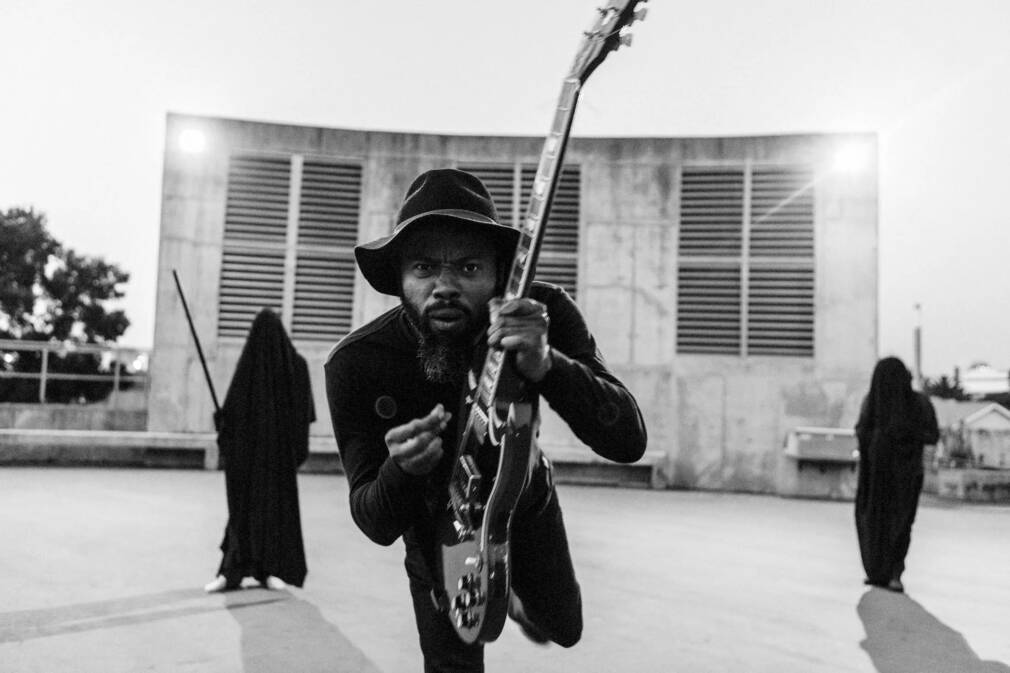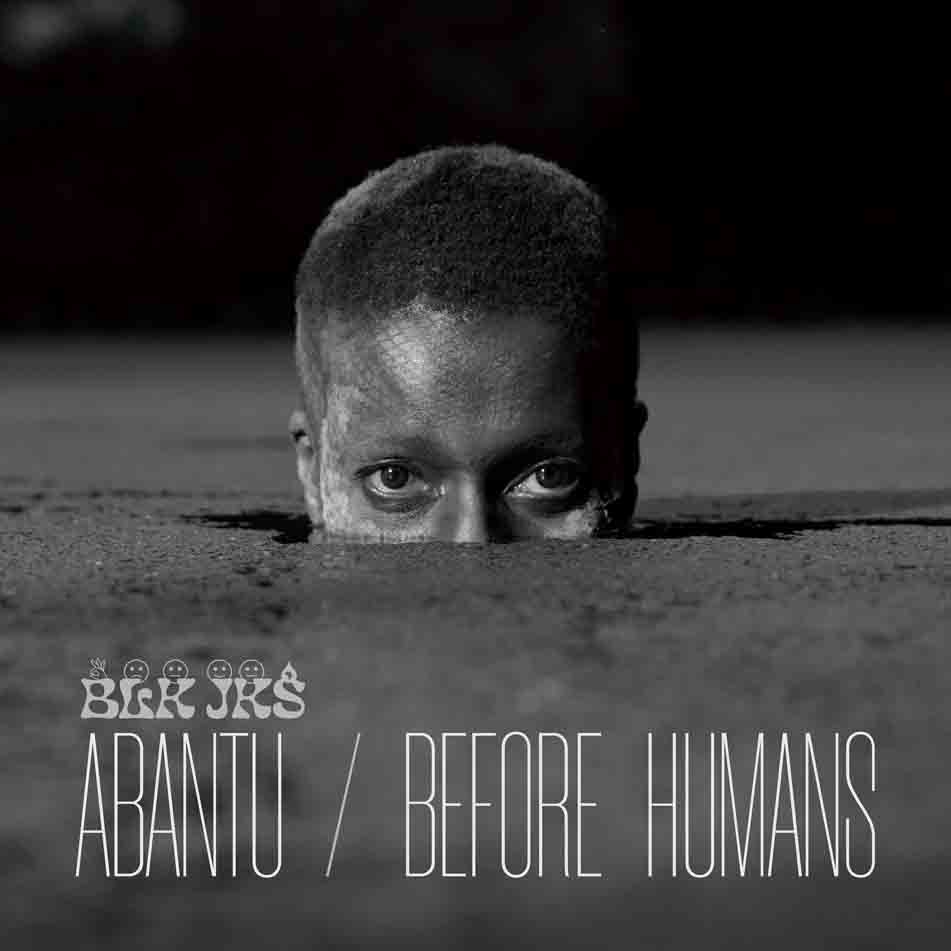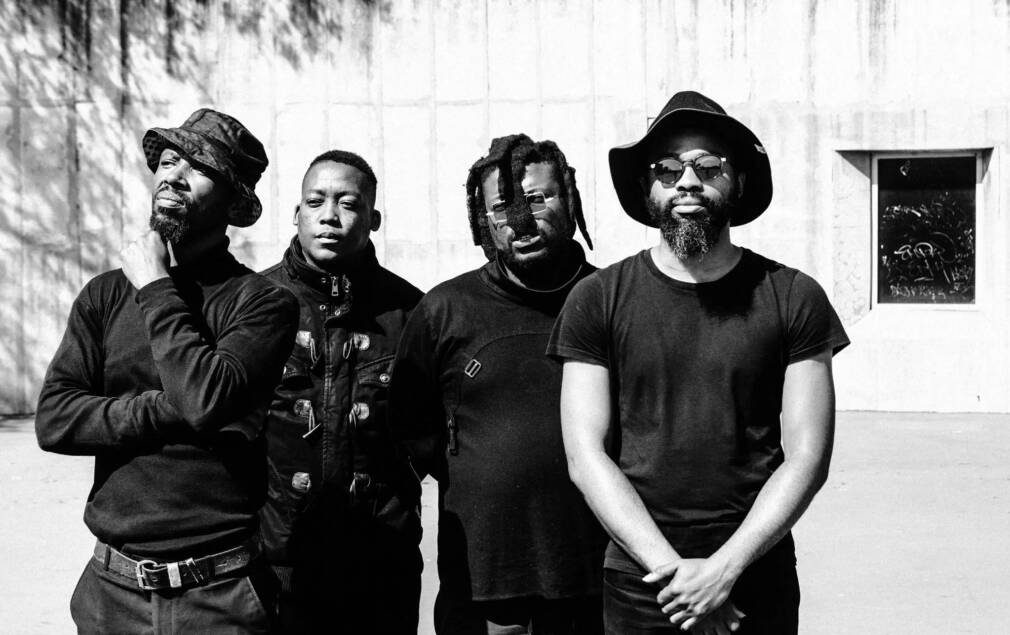Sitting in on a call with Molefi Makananise, BLK JKS’ esteemed bassist, it should have been obvious that the conversation would meander into the metaphysics of time. It has been, after all, 10 years since the BLK JKS have released their breakout album After Robots, a work that boldly explored the future edges of music to critical acclaim. To reintroduce themselves to the world, the group decided to pair their latest album, Bantu, Before Humans, with a short documentary to quell any questions about the group’s musical timeline. During the live set recorded at 44 and Long, we see a South African journalist grilling the group asking, “Where have you been?” in more ways than one. Molefi, speaking for the BLK JKS, which also includes guitarist Mpumelelo Mcata and drummer Tshepang Ramoba, has many answers. They’re not the kind of answers that would satisfy the average listener in the same way that the BLK JKS don’t make the kind of music that everyone can swallow upon first listen. Instead Molefi draws on grand themes of life, time, and the world itself to bring reference to the enigmatic and compelling group that is the BLK JKS.
Moving back in time to come forward… The BLK JKS broke out of the South African underground in the early 2000s after a cosign from Diplo which brought the group into the inner circle of rock’n’roll legends. The Mars Volta, TV On The Radio, The Roots, Pharrell Williams, and MGMT are a few of the icons the group came to befriend, snap photos with, and open for. Rolling Stone dubbed the group “Africa’s Best New Band” in 2009 and BLK JKS took the stage at SXSW. In the same year “After Robots”, the group’s debut album, sent shockwaves through the rock’n’roll scene and earned them independent prestige among the likes of Dave Grohl. Riding the “After Robots” wave, the group then recorded a 4 track Master EP at Jimi Hendrix’s Electric Ladyland studio.
Since, it has been long bouts of radio silence interspersed with a few singles dropping in the beginning and end of the 2010s. For a group that had penetrated into the center of the rock’n’roll music scene, it was difficult for fans to imagine what BLK JKS has been up to all this time. Now, the BLK JKS are back, and Molefi sat with us to clear the air.
“It’s been life. We’ve been breathing for the last 10 years,” says Molefi, with a reassuring calm. “We did After Robots and After Robots came to life. But then, as I said before, we had to experience life. We had to immerse ourselves in the experience of our life in order for us to get to where we are today. So, what’s been happening in the past 10 years, before Abantu, Before Humans, has been the happenings for us to gather the content for this record. All those experiences.”
For Molefi and the BLK JKS, a cornerstone of their identity has always been authenticity. As an indie group shot into the stratosphere of international acclaim, keeping and developing that instinct isn’t obvious. It takes patience and…time.
“As time goes on,” Molefi elaborates, “when the After Robots glory subsided, to give space for the next experience, we had to experience all that a normal human being can experience in life. To gather that honest content and put it across as honest as it is. It’s not really about the glamour or this and that, the bling blings and all those… If they come they come. That will be our rewards.”

So, what then are the BLK JKS about?
“We are about reality. BLK JKS is about life man. And when you talk about life then you are talking about the reality of our existence, our day to day experiences. It’s about love, it’s about hate, it’s about politics, it’s about non-political life, it’s about connectivity to the higher beings, the higher powers, the ancestors. It’s about happiness, the joy that we experience and the good and the bad and the ugly that we come across in life, that our fellow human beings experience. The situations that affect us everyday in life.”
This may sound like a tall order for most groups, but for the BLK JKS, it’s a matter of closing circles, of drawing the line between polarities. The titles bring this concept into full view; Before Humans, After Robots. Everything that’s left is in-between. The song titles also drop the hint. Take the track ‘Running – Asibaleki / Sheroes Theme’ for instance. Asibaleki is Zulu for “we’re not running”, so the title reads, Running – We’re Not Running. A contradiction or something more? Mmao Wa Tseba – Nare / Indaba My Children translates roughly from Zulu to “Your Mother Knows / Story of My Children”. Again we see a contrast of time and meaning, of reality and abstraction.
“If you look at those titles they are short abbreviations, summarised subjects in life,” says Molefi. “Running, for example, there is a lot of running happening in the world. We are running around right now like confused molecules. There’s this pandemic that makes us run around, we don’t know what the solution is yet but it is here it is the experience. And there are people running for higher powers. People are running for power; for good and for bad. Some people are just running for power because it’s just their nature. They want to be powerful, but as to what they do with the power, it’s something else, it’s another story. Whether you use your power to preserve life, to do good, or whether you use your power to destroy life in order to feed something. It’s all in there. Those are our titles, they speak.”
I prodded into the obvious contradiction between their status as underground heroes and their position as International ambassadors and how this has informed the BLK JKS creatively. Was there any blood drawn from the double edged sword of popularity in authenticity, in the vein of BLK JKS fan David Grohl’s ex frontman, or was there an empowering sense of duty and representation for a scene that doesn’t oft see the spotlight?
“Once again, unfortunately we cannot run away from the time factor. It’s all in time and time is the builder. It allows us and gives us the opportunity to build and to evolve as life evolves,” says Molefi, totally at peace.
“For example when we started, we just knew that we wanted to make this music and as we made it we wanted to build our own follower-ship. Our own fanbase. We knew that, in all the people that exist in this world, a couple of them are bound to understand what we are about. That fanbase, we came a long way with them, we grew up with them. Even though we were absent for almost 10 years. On the shelves. *laughs* People understood what we are about. We are honest. We are loyal. We are loyal to the music, so our fans are loyal to our music as well. We are also loyal to our fans.”
The BLK JKS aren’t alone in navigating the rough path from a local African scene into the eyes of the world. One such figure who accomplished that evolution with grace was Ali Farka Touré, the Malian guitarist and musical pioneer who passed away in 2006. It happens that BLK JKS were able to tour with his son, Vieux Farka Touré, and find, through the strong bonds of ancestry, the formative inspiration that can be heard in BLK JKS music and in Molefi’s memories. He shares these insights between musings of inspiration and influence.
“Our inspiration. I prefer inspiration over influence. They both have roles to play in our life as a band and also as individuals, in our musical journey. Inspiration is something that sustains us. In our musical journey as a band, we were inspired by many many greats; Ali Farka Touré and Vieux Farka Touré, his son. I had listened, just a little bit, to Ali Farka Touré when I was young, very young. I got to know Ali Farka Touré and I was like ‘wow man, this is rock’n’roll, but it’s blues, but it’s African, and it’s in Mali. As time goes on I join the band and here were are on stage touring with Vieux Farka Touré, his son. You know, the inspiration come all the way, it’s a build up.”
Here is where it comes full circle.
“I’ve been inspired all the way. That’s what I mean when I say that inspiration is like a light. It begins as a spark in your soul and it will lead you to the right place. That’s how it led me to experience Ali Farka Touré through his son. These are some of the things that I have to explain. It’s easy for us to say influence or inspiration but when you go into details as to what those things have done, the impact of the inspiration, or what you could consider as sometimes you then see that, this is not something small. There is a science behind these happenings, these things that inspire us.”
Now, that inspiration is dripping down onto the youth of South Africa and around the world.
“So, yeah we are inspiring young brothers and sisters, we can see it with our own eyes because they come to us and they tell us that we are actually inspiring them. You’re face to face with someone telling you, ‘I am doing this because I was inspired by you.’ And that feels like, oh man, I’ve done something wrong. You shouldn’t be like me man. *laughs* Those are the great moments and they happen almost every time time allows them to happen. When someone tells you that you’ve inspired them it’s something that you take home with you and it makes you sleep like a little baby at night.”
This is one of the many reasons BLK JKS has now chosen to expose their story through the video medium. It’s an attempt to engage their audience in a new way, and an effort to branch out to the people that have become their loyal fans both new and old.
“We had to embrace. The BLK JKS have been finding ways to tell our stories through our music. Trying to get it out to people and hoping that the listenership will expand and people will try and follow what we are about. What the band is all about and what the music is all about. And how the music sounds. So when video opportunities come along we just had to embrace and expand the dialogue on those kinds of platforms. And because we are creatives amongst us there’s Mpumi who is a filmmaker, we try to outsource that talent within us. So it was just about time for us to actually reach out and make videos and make visuals tell the story of the actual music. It’s an evolution of kinds.”
The evolution is continuous and it’s all held in the gentle hands of time. Now (whatever that means) it is Before Humans, which tells me that BLK JKS have yet to begin their musical journey. We leave you with the words of Molefi, acquired through the wisdom of time.
“Time is the ultimate builder. Time is the doctor, the healer. Time is the killer. Time is something that is in charge. Time is an invisible super power. Time is something that representS the maker of everything. The creator of everything. Time is here to sort everything out. So, when you think about the concept of time, we are born, we grow, we get old, some of us will reincarnate, some won’t. It is all in the judgement of time. It’s all in the making of time. Time, my brother, is very very very important.”
Abantu, Before Humans available on all platforms.





